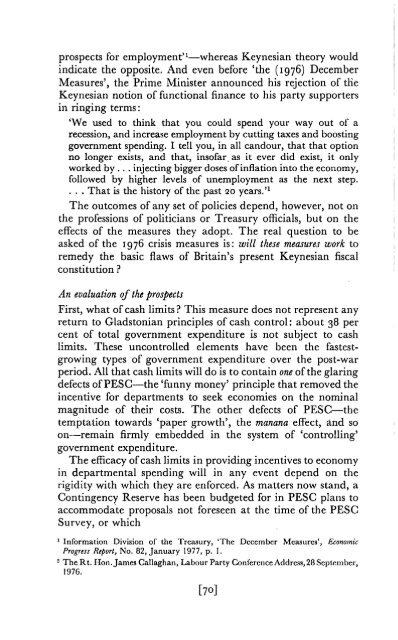THE CONSEQUENCES OF MR KEYNES.pdf - Institute of Economic ...
THE CONSEQUENCES OF MR KEYNES.pdf - Institute of Economic ...
THE CONSEQUENCES OF MR KEYNES.pdf - Institute of Economic ...
Create successful ePaper yourself
Turn your PDF publications into a flip-book with our unique Google optimized e-Paper software.
prospects for employment' 1 —whereas Keynesian theory would<br />
indicate the opposite. And even before 'the (1976) December<br />
Measures', the Prime Minister announced his rejection <strong>of</strong> the<br />
Keynesian notion <strong>of</strong> functional finance to his party supporters<br />
in ringing terms:<br />
'We used to think that you could spend your way out <strong>of</strong> a<br />
recession, and increase employment by cutting taxes and boosting<br />
government spending. I tell you, in all candour, that that option<br />
no longer exists, and that, ins<strong>of</strong>ar as it ever did exist, it only<br />
worked by . . . injecting bigger doses <strong>of</strong> inflation into the economy,<br />
followed by higher levels <strong>of</strong> unemployment as the next step.<br />
. . . That is the history <strong>of</strong> the past 20 years.' 1<br />
The outcomes <strong>of</strong> any set <strong>of</strong> policies depend, however, not on<br />
the pr<strong>of</strong>essions <strong>of</strong> politicians or Treasury <strong>of</strong>ficials, but on the<br />
effects <strong>of</strong> the measures they adopt. The real question to be<br />
asked <strong>of</strong>the 1976 crisis measures is: will these measures work to<br />
remedy the basic flaws <strong>of</strong> Britain's present Keynesian fiscal<br />
constitution ?<br />
An evaluation <strong>of</strong> the prospects<br />
First, what <strong>of</strong> cash limits? This measure does not represent any<br />
return to Gladstonian principles <strong>of</strong> cash control: about 38 per<br />
cent <strong>of</strong> total government expenditure is not subject to cash<br />
limits. These uncontrolled elements have been the fastestgrowing<br />
types <strong>of</strong> government expenditure over the post-war<br />
period. All that cash limits will do is to contain one <strong>of</strong>the glaring<br />
defects <strong>of</strong> PESC—the 'funny money' principle that removed the<br />
incentive for departments to seek economies on the nominal<br />
magnitude <strong>of</strong> their costs. The other defects <strong>of</strong> PESC—the<br />
temptation towards 'paper growth', the manana effect, and so<br />
on—remain firmly embedded in the system <strong>of</strong> 'controlling'<br />
government expenditure.<br />
The efficacy <strong>of</strong> cash limits in providing incentives to economy<br />
in departmental spending will in any event depend on the<br />
rigidity with which they are enforced. As matters now stand, a<br />
Contingency Reserve has been budgeted for in PESC plans to<br />
accommodate proposals not foreseen at the time <strong>of</strong> the PESC<br />
Survey, or which<br />
1 Information Division <strong>of</strong> the Treasury, 'The December Measures', <strong>Economic</strong><br />
Progress Report, No. 82, January 1977, p. I.<br />
- TheRt. Hon. James Callaghan, Labour Party Conference Address, 28 September,<br />
1976.<br />
[70]












